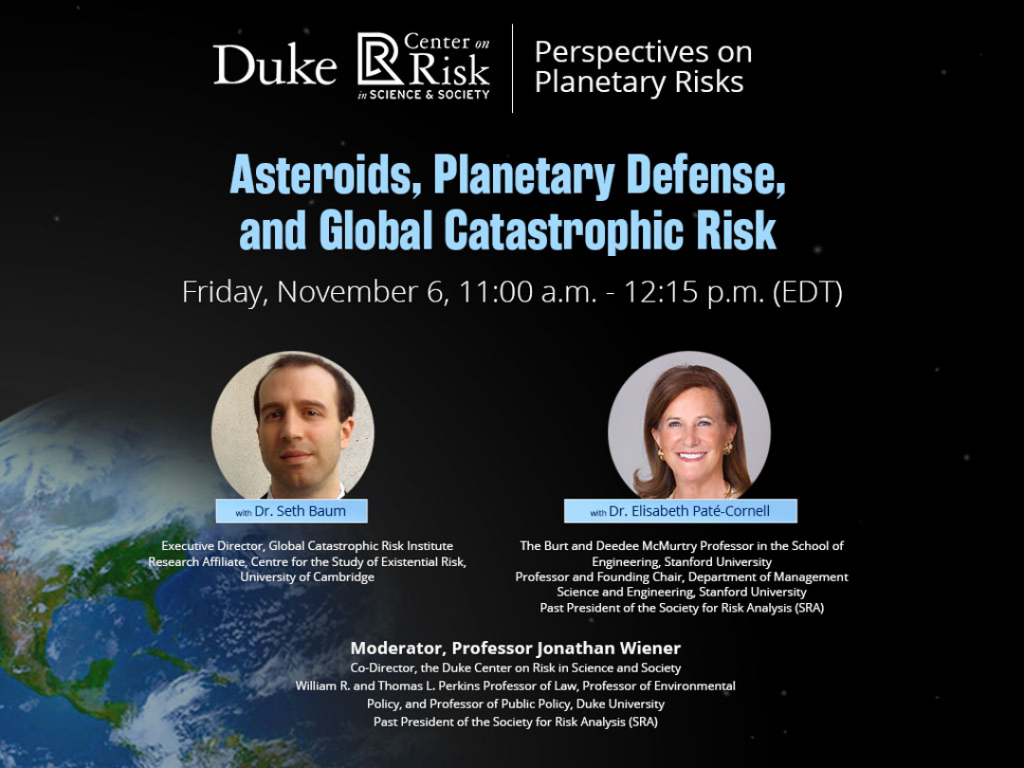Asteroids, Planetary Defense, and Global Catastrophic Risk
06nov11:00 am12:15 pmAsteroids, Planetary Defense, and Global Catastrophic Risk
Time
November 6, 2020 11:00 am - 12:15 pm(GMT-05:00)
Event Details
Speakers Dr. Seth Baum Executive Director, Global Catastrophic Risk Institute
Event Details

Speakers
Executive Director, Global Catastrophic Risk Institute
Research Affiliate, Centre for the Study of Existential Risk, University of Cambridge
Asteroids as a case study in global catastrophic risk
Global catastrophic risk can be defined broadly as risks to the survival of life or global human civilization. The extreme severity of global catastrophic risks makes them important even if their probability is low. This presentation discusses recent research on asteroid risk and its implications for the broader study of global catastrophic risks. Asteroids are a valuable case study for both risk and policy analysis of global catastrophic risk. For risk analysis, asteroids are distinctive as being arguably the global catastrophic risk that is the most well-quantified in terms of probability and severity. This is aided by robust empirical data from the geologic history of asteroid collision events and ongoing astronomical surveys. However, the human consequence of asteroid collision is much less well understood, in part due to indirect effects such as the explosion from an asteroid collision being mistaken as a nuclear attack. Likewise, it is difficult to resolve the risk-risk tradeoffs in the proposed use of nuclear explosives for asteroid deflection. As a policy topic, asteroids have a relatively long history of both research and policy attention. Scientific awareness of asteroid risk dates to the 1940s and policy activity dates to the late 1980s. Whereas it is sometimes proposed that policymakers pay less attention to extreme low-probability/high-severity risks, policymakers have given more attention to the low-probability/high-severity portion of asteroid risk. A closer look at asteroid policy sheds light on the broader prospects for policy on global catastrophic risk.
The Burt and Deedee McMurtry Professor in the School of Engineering, Stanford University
Professor and Founding Chair, Department of Management Science and Engineering, Stanford University
Past President of the Society for Risk Analysis (SRA)
Asteroids Risk Assessment: A Probabilistic Model
Following the 2013 Chelyabinsk event, the risks posed by asteroids attracted renewed interest, from both the scientific and policy-making communities. Impacts from near-Earth objects (NEOs), while rare, have the potential to cause great damage to cities and populations. Point estimates of the risk (such as mean numbers of casualties) have been proposed, but because of the low-probability, high-consequence nature of asteroid impacts, these averages provide limited actionable information. While understanding that more observations are needed to refine its input (e.g., NEO diameters), I will present a probabilistic model that allows a more complete evaluation of the risk of NEO impacts—as we know it today—because the results are probability distributions that cover the range of potential casualties. We show that civil defense measures are likely to be beneficial but not a panacea. We also compute the probability of an impact with cataclysmic effects. We conclude that there is a continued need for NEO observation, and for analyses of the feasibility and risk-reduction effectiveness of space missions designed to deflect or destroy asteroids that threaten the Earth.
Moderator
Co-Director, the Duke Center on Risk, in Science and Society
William R. and Thomas L. Perkins Professor of Law, Professor of Environmental Policy, and Professor of Public Policy, Duke University
Past President of the Society for Risk Analysis (SRA)
Dr. Seth D. Baum is Co-Founder and Executive Director of the Global Catastrophic Risk Institute, a nonprofit and nonpartisan think tank. He is also an editor of the journal Science & Engineering Ethics and an honorary affiliate of the Centre for the Study of Existential Risk at the University of Cambridge. He leads an interdisciplinary research agenda of risk, ethics, and policy analysis of catastrophic risks, focusing primarily on artificial intelligence, asteroids, and nuclear war.
Dr. Marie-Elisabeth Paté-Cornell is a Professor and the Founding Chairman of the Management Science and Engineering department at Stanford. Her specialty is engineering risk analysis, with applications to complex systems (space, medical, offshore platforms, cybersecurity, nuclear, etc.). She is a member of the National Academy of Engineering, the French Académie des Technologies, the Draper Lab Corporation, the NASA Advisory Council, and a Distinguished Visiting Scientist of the Jet Propulsion Laboratory. She was a member of the President’s Foreign Intelligence Advisory Board (2001 to 2008) and several other boards. She holds a BS in Mathematics and Physics, an Engineering degree in Applied Math/CS, an MS in Operations Research, and a Ph.D. in Engineering-Economic Systems both from Stanford University. Her current research focuses primarily on space systems and on cyber risk analysis, generally for a specified organization, and related topics. She was President of the Society for Risk Analysis (SRA) in 1995–96.
Comments are closed.

